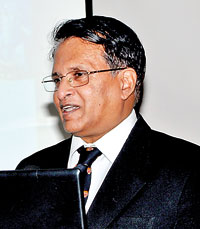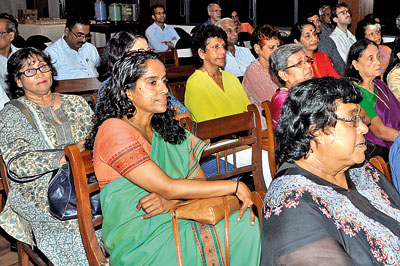Expand High.Ed. enrolment emphasising Economic Development: Dr Aturupane
View(s):Dr. Harsha Aturupane, a leading Economist of the World Bank, this week, said that, in the level of Higher Education (HE) there has been a rapid expansion of enrolment matching global trends, with an explosion of HE, but Sri Lanka needs to expand enrolment in HE further, with emphasis on programmes important for economic development.

Dr. Harsha Aturupane
Dr Aturupane expressed his views on, 70 Years of Post-Independence Education Development, 1948-2018: Achievements and Challenges to Economic Progress and Social Integration, at an event organized by the Cambridge Society of Sri Lanka comprising, the Alumini of the University of Cambridge, UK. He explained that Sri Lanka had a strong foundation for Education Development from before Independence. “There was a historical tradition of investment in Education.
“Although we start in 1948, because of Independence, there is actually, a history which is very interesting and little known, really what happened onwards depended partly on the history of pre- independence,” he said He pointed out that the male adult literacy rate in Sri Lanka, in 1815, was equal to that of England; and there were visionary political leaders in the 1930’s and 1940’s.
“There has been excellent progress in providing access to Education from 1948 onwards. A combination of demand and supply side policies to promote enrolment and retention in Primary and Secondary Education has been established. Successive governments have shown strong policy commitment.
“General Education is a story of expansion and growth from 1948 onwards. Statistics show that, from 1950, we see an expansion of government schools at that time. We had roughly 3,200 schools and 1.3 million students enrolled in them, with 38,000 teachers,” he said.
He explained that, “Yet, according to recent figures, during 2017, there were nearly 10,200 schools enrolling 4.2 million children, with 242,000 teachers, which is more than required.” He further explained that, though there are more teachers, Sri Lanka faces an issue with English teachers.
“There are also problems in AL Science and Mathematics teachers, as their salaries are so low that other people who graduated in Mathematics and Sciences can earn salaries more than school teachers,” he said.
He said that as teacher salaries are low, the teachers remaining in service are those who are wealthy enough to remain in the Education system.
Dr Aturupane said that Sri Lanka has attained relatively high levels of enrolment and gender parity in Primary and Secondary Education. However, there are Education quality challenges, especially learning outcome and the socio–emotional skills of students.
 “There are also regional variations in Education achievement, with significant differences between Provinces, and within Provinces, in Districts. Engaging students in co-curricular and extra-curricular activities, and developing their transversal skills or soft skills, is also a key challenge for the future. In addition, the Education system needs to promote values and civic behaviours important for a modern liberal democracy,” he explained.
“There are also regional variations in Education achievement, with significant differences between Provinces, and within Provinces, in Districts. Engaging students in co-curricular and extra-curricular activities, and developing their transversal skills or soft skills, is also a key challenge for the future. In addition, the Education system needs to promote values and civic behaviours important for a modern liberal democracy,” he explained.
“Nevertheless, Sri Lanka needs to expand enrolment in HE further, with emphasis on programmes important for economic development. In addition, worldwide, there is an emphasis on the quality of teaching and learning, the importance of blending academic excellence with socio-emotional skills, and the economic relevance of graduates. This is an important challenge for HE development in the future,” he said.
“A further key challenge for HE institutions is promoting Research and Innovation. Currently, universities are mainly teaching-focused. In the next stage of development at least some of the universities need to develop a culture of Research and Innovation. This would include both academic Research for publication in journals, books and monographs, and Innovation which can drive industrial and service sector growth. Research can also make contribution to public policy.”
“Investment in human capital is key to Economic growth and Social development. Research and Innovation, in particular, drive growth in the modern knowledge Economy. Education also plays a key role in promoting social cohesion. Education progress from 1948-2018 has laid a solid foundation to promote these goals in the future.”
The President of the Cambridge Society of Sri Lanka, Stanley Obeyesekere made the welcome address. - Kasun Warakapitiya


